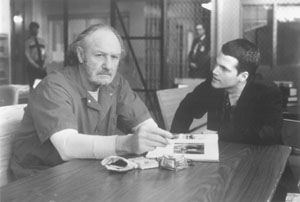Dead Script Walking
Pen Pals: Chris O'Donnell (right) visits his grandfather
(Gene Hackman), a condemned murder fighting for a stay
of execution, in "The Chamber."
John Grisham adaptation tips the death-penalty scales
By Richard von Busack
DEATH-ROW MOVIES practically constitute a genre unto themselves, with drama and urgency built into them--or so one hopes. In The Chamber, Gene Hackman plays Sam Cayhall, a Klansman who helped detonate a bomb that killed a couple of children in a Jewish lawyer's office in the 1960s. His appeals denied, he waits for an appointment with Mr. Coughee (Matt Groening's proposed but never-adopted nickname for the gas chamber). Chris O'Donnell plays Adam Hall, a Chicago lawyer who goes on a pro bono mission to stay the execution. He reason is personal: Cayhall is his grandfather. Much squabbling ensues as the clock ticks, and we wait for the intergenerational clinch.
It was "heritage, not hate" that made the old man a Klan member, but before we discover this fact, O'Donnell's character has to be warned many times to "be very careful about dredging up the past"--as if John Grisham, who wrote the novel The Chamber was based on--weren't above plagiarizing himself. Grisham is probably outperforming sorghum as Mississippi's main export. The script is composed of stock Grisham clichés--"I am pursuing the truth by any means necessary!"--and Faye Dunaway's wretched performance as Hall's mother has to be seen to be disbelieved. O'Donnell solidifies his reputation as the Burt Ward of the 1990s. He's a soprano trying to sing baritone, an actor of such inconsequentiality that when he stands in profile, you can practically see daylight coming out of his ears.
Director James Foley's use of an aerial camera and Carter Burwell's distant, ambient music lend a sense of open space to what could have been a badly claustrophobic movie full of nothing but interiors. Bo Jackson, showing an aptitude for acting that's nearly as good as his aptitude for sports, has a small part as Packer, Cayhall's guard, and plays it with considerable dignity. Hackman is the pearl in this pigpen, keeping The Chamber from being as tedious as A Time to Kill. Even through a wire screen, he bests the ensemble and makes the sketchily written, unlikely character come alive.
Hackman's character makes the argument that he who harbors racism in his heart is just as guilty as a Klansman, a bit of reasoning--that the sin in your heart is as terrible as the sin you commit--that bedevils Christian thinkers. Here, the notion serves as a gross simplicity used to reduce the thorny issue of capital punishment; it's a way of rehabilitating Cayhall so we'll empathize with the condemned man--as if Hackman's powerful acting and Foley's tight close-ups gave us a choice. Who deserves the gas chamber may be of less importance than how we perceive its function. Killer: A Journal of Murder, which was seen by most critics as a simple antideath penalty tract, included a shot of a prison guard at a Seder dinner. This Passover scene made an interesting suggestion: Might the death penalty be symbolic magic, a way of marking our doors with blood to keep the Angel of Death away?
[ Metro | Metroactive Central | Archives ]
This page was designed and created by the Boulevards team.

Francois Duhamel
The Chamber (R; 110 min.), directed by James Foley, written by William Goldman and Chris Reese, based on the novel by John Grisham, photographed by Ian Baker and starring Gene Hackman and Chris O'Donnell.
From the October 17-23, 1996 issue of Metro
![[Metroactive Movies]](/movies/gifs/movies468.gif)